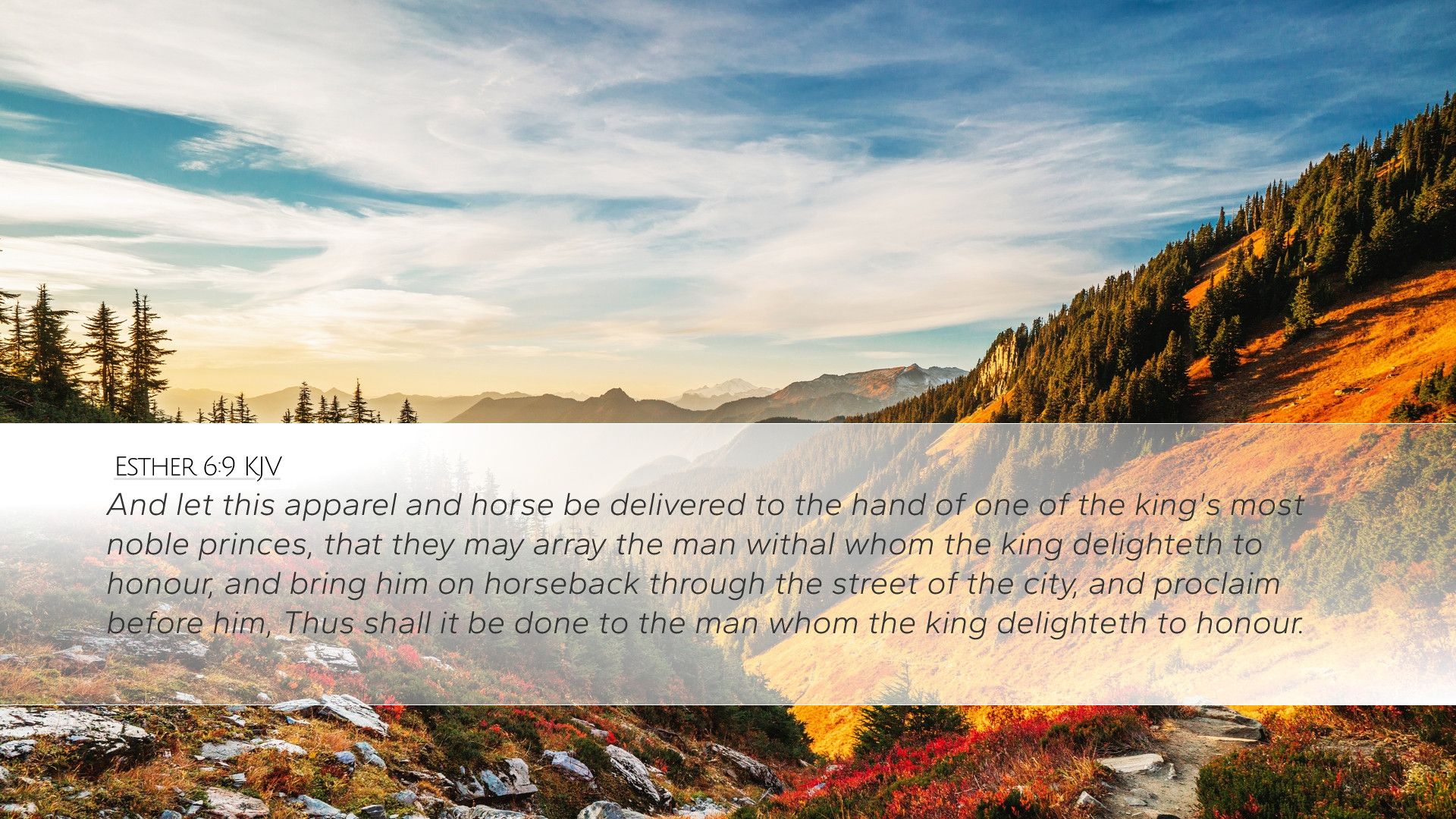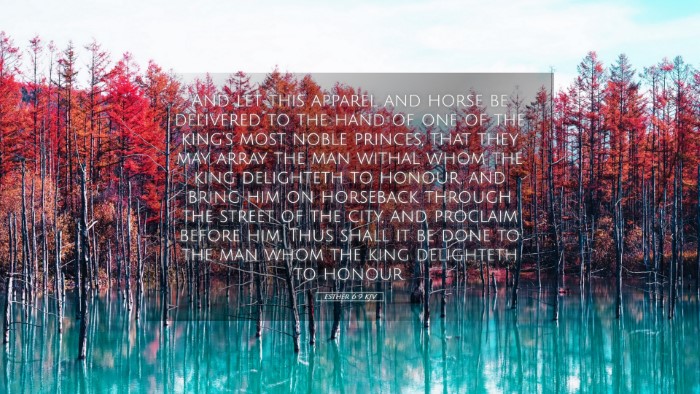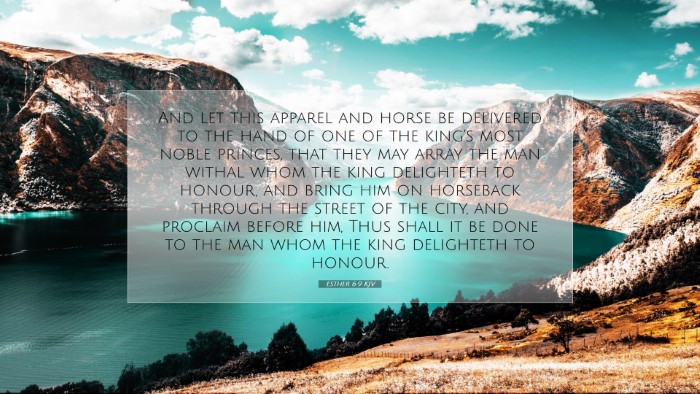Old Testament
Genesis Exodus Leviticus Numbers Deuteronomy Joshua Judges Ruth 1 Samuel 2 Samuel 1 Kings 2 Kings 1 Chronicles 2 Chronicles Ezra Nehemiah Esther Job Psalms Proverbs Ecclesiastes Song of Solomon Isaiah Jeremiah Lamentations Ezekiel Daniel Hosea Joel Amos Obadiah Jonah Micah Nahum Habakkuk Zephaniah Haggai Zechariah MalachiEsther 6:9
Esther 6:9 KJV
And let this apparel and horse be delivered to the hand of one of the king's most noble princes, that they may array the man withal whom the king delighteth to honour, and bring him on horseback through the street of the city, and proclaim before him, Thus shall it be done to the man whom the king delighteth to honour.
Esther 6:9 Bible Commentary
Commentary on Esther 6:9
Introduction
Esther 6:9 is a pivotal verse within the narrative of the Book of Esther. This verse captures a moment that exemplifies divine providence, irony, and the reversal of fortune—essential themes in the entire account. Important contributions from public domain commentaries, namely those by Matthew Henry, Albert Barnes, and Adam Clarke, provide deeper insights that help pastors, students, theologians, and Bible scholars reflect on its profound implications.
Contextual Background
The Book of Esther unfolds during the reign of King Ahasuerus (Xerxes) and chronicles the challenges faced by the Jewish people within the Persian Empire. The narrative highlights themes of identity, courage, and the concealed workings of God. In Esther 6, we observe a turning point where the king, unable to sleep, orders the chronicles to be read, leading him to uncover Mordecai's loyalty and Haman's sinister plots.
Exegesis of Esther 6:9
The verse in question states: “And let this apparel and horse be delivered to the hand of one of the king’s most noble princes, that they may array the man withal whom the king delighteth to honour, and bring him on horseback through the street of the city, and proclaim before him, Thus shall it be done to the man whom the king delighteth to honour.”
This directive reveals the king's desire to honor Mordecai, completely unaware of Haman's plot against him. The regal imagery of the horse and royal apparel symbolizes honor and recognition, highlighting the elevation of one of God's faithful servants amidst adversity.
Insights from Matthew Henry
Matthew Henry interprets this verse within the framework of divine providence, noting how God orchestrates events to bring about justice and honor for those who remain faithful. He emphasizes the irony of Haman's intention to belittle Mordecai, only for Haman himself to be the instrument of Mordecai's exaltation. Henry writes, “Those who seek to destroy the people of God will find their plans turned against themselves.” This reflects the biblical principle that God’s purposes prevail over human actions.
Insights from Albert Barnes
Albert Barnes provides a theological reflection on this verse, suggesting that God often raises up individuals to honor His servants at unexpected moments. He highlights that the king’s command not only reflects the king's personal honor towards Mordecai but is also part of God's overarching plan for the Jewish people. Barnes elaborates on the sense of urgency and deliberate action required in honoring the righteous, suggesting that it is a vital aspect of upholding justice.
Insights from Adam Clarke
Adam Clarke delves into the details of the verse's imagery, breaking down the symbolism of the 'horse' and 'apparel.' He elaborates that the horse represents authority and power, while the royal apparel signifies elevated status. Clarke interprets the verse as a potent reminder that God can turn circumstances around, using the very adversaries of His people to accomplish His purposes. He comments on the importance of humility before the Lord, indicating that the true honor bestowed by God is far superior to any earthly recognition.
Thematic Implications
God's Sovereignty: The events surrounding Esther 6:9 illustrate the sovereignty of God in the affairs of humanity. Despite seeming chaos, God’s control over events comes to light, reinforcing the belief that no one can thwart His plans.
Ironic Reversals: The text presents a dramatic turnaround from Haman’s intended execution of Mordecai to an unexpected honor. This serves as a reminder that God often works through ironies to fulfill His will, showing that human plans can be upended.
Encouragement for the Faithful: For believers, the triumph of Mordecai offers encouragement that faithfulness to God is always noticed and ultimately rewarded, even in the face of dire circumstances.
Conclusion
In summary, Esther 6:9 profoundly resonates through its themes of honor, providence, and divine justice. Insights from revered commentaries illuminate the text, revealing layers of meaning that extend beyond historical narrative. This verse stands as a testament to God's faithfulness and the truth that those who honor Him will ultimately be honored. For pastors, theologians, and scholars, this moment in Esther serves as an invitation to reflect upon the dynamics of power, justice, and divine providence in both ancient and contemporary contexts, reminding us of the unwavering nature of God's commitment to His people.


